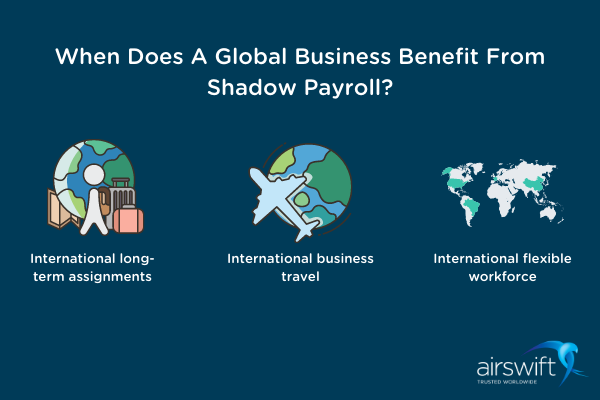By
Dharmeswaran Yokheswarem
May 18, 2022
Updated
September 18, 2024
Understanding the function of shadow payroll
Shadow payroll is a term you may frequent if you are working in a multinational organization. While the term seems elusive, its function is critical to an organization that has a significant foreign presence.
Understanding the concept of a shadow payroll can prove to be useful in mitigating potential risks for both company and employees.
The shadow payroll system can apply to employers who have granted their employees the right to work remotely, especially from outside of the country where they are legally employed. With current employment trends favoring remote work and foreign hiring of international employees, the use of shadow payroll is highly anticipated.
This article explains what shadow payroll is, its process, and crucially, the benefits of engaging with a global expansion partner to support the organization. Let’s dive in.
What is shadow payroll?
.png?width=800&name=shutterstock_1590133981%20(1).png)
Source: billionjobs/Shutterstock
Shadow payroll is most often used to properly report and pay taxes and social security for an expat employee while the individual works in a foreign country.
Shadow payroll does this by distinguishing between the host and home country. The home country will be where the employee is leaving from and the host country will be the destination country where the employee will be working. For example, let us assume that you are a company based in Brazil and employ a person in Brazil to be based on a long term assignment in Japan. In this scenario, the employee’s home country would be Brazil and their host country would be Japan.
Remote employees in host countries are either paid through the host or home country’s payroll, and in some cases, through both countries. A shadow payroll is set up to report the local tax and social security obligations in the host country.
This way, the shadow calculation allows the employee and employer to retain compliance without needing to make the actual salary payments to the employee in both countries.
What is the shadow payroll process?
.png?width=800&name=shutterstock_1500036665%20(1).png)
Source: createjobs51/Shutterstock
To further digest the shadow payroll process, let’s use an Airswift case study, Chenevert Inc. After announcing a divestment from parent company Fuelta, Chenevert Inc was faced with the challenge of mobilising a global workforce within a one month time frame. The daunting task required substantial resources and facilitation and despite its magnitude, Chenevert Inc succeeded in its global expansion.
The shadow payroll process assisted the company when their global workforce consisted of commuting employees who were at the risk of triggering multiple tax commitments. This meant that these employees were required to spend significant amounts of time in multiple countries outside of their own country of residence. This opens them up to liabilities for multiple country tax obligations including their own.
The solution Chenevert Inc went with was to enlist Airswift to set up a Global Employment Company (GEC) in a tax free zone. This was used to employ these commuters and run a shadow payroll in either the host or home country.
The shadow payroll process is as follows:
- Calculating the taxes and social security charges due in the home country, where the salary is paid from and the taxes and social security charges that are withheld from the local payroll.
- Calculating the taxes and social security charges in the host country. This is to file the appropriate submissions of any remnant payments to local authorities.
- To avoid paying an employee’s salary twice the taxes and social security payment are calculated for the host country without processing the actual payment. Hence the “shadow”, while reporting all wages and benefits as income being paid.
- Compliance with both host and home country income tax obligations are met while fulfilling the employees payroll obligations.
Chenevert Inc was able to focus on their global expansion without wasting internal resources on solving tax complications. Airswift operates the shadow payrolls in each of the host countries and countries of residence.
Identifying when your global business can benefit from having shadow payroll
Let us revisit when the need for shadow payroll arises. While we have mentioned that organizations with foreign remote workers can benefit from shadow payroll, the specifics vary for different organizations. Here are some areas that will see the need for shadow payroll.

International Long-Term Assignments
International assignments are the most common cause for shadow payroll. Employees on such assignments often stay in the host location for a minimum of 2 years. During this period, they are entitled to benefits such as home social security, travel and meal allowances, and taxable costs within the scope of their assignment. The entire payroll package including tax gross ups will need to be reported.
In some cases, the employee is required to continue paying tax in the home location. Paying taxes during term assignments are inconvenient for an employee. The employer must then meet these liabilities so as to not burden the employee. The shadow payroll is required to ensure the host payroll receives the correct taxable income as well as manage any tax protections policies for the hosts liabilities in the home location.
International Business Travel
Project workers and short term business travelers fall within this area. Project workers are not fixed to a specific location for a long period of time and often work in several countries throughout the year. A project worker is taxable for the number of days worked in each location making them liable to local legislations and payroll reporting.
Post pandemic, many countries have amended their compliance to employees who travel overseas. Employers undergo more scrutiny as immigration and taxes are reviewed strictly to ensure compliance. A shadow payroll is expected to be well versed in navigating these new rules and mitigating the company and employee from new liabilities.
International Flexible Workforce
Remote working is quickly becoming the go-to workforce solution, but it comes with its own set of challenges as well. While it does benefit companies to hire internationally, HR policies to alleviate tax burdens in the working locations need to be established.
In the event that remote work is established, shadow payroll will be used if the employee becomes a resident in the host location while receiving pay from the home location. While it is an individual choice to accept the tax burdens, the complexity to calculate it and deduct the right amount according to the combination of counties will prove challenging.
The importance of shadow payroll for your global business

Source: Dencg/Shutterstock
Payroll matters are often complex and require great attention to detail. Slight errors can cause insurmountable liabilities in the form of fines and bans. Global businesses should boast compliance and employee engagement. In order to do so, the employer needs to fundamentally ensure that their global workforce pays no more tax than they would if they operated from home.
This approach increases the company's ability to attract and retain talent. Employees are likely to accept expat assignments that incur high taxes knowing that the company will meet the respective home-country tax policies. Matters such as double taxation, tax requirements and tax treaties should preferably be managed by the organization.
Organizations that enlist a shadow payroll are able to offer more security and benefits for employees that operate in foreign nations. This improves the organization's image for both employees and clients as an established international business.
Using shadow payroll modernizes an organization by encouraging internal payroll teams to improve their home country payroll system, especially for remote employees. It is not uncommon for multinational companies to be using payroll systems that were designed decades ago.
Organizations that seek to expand internationally must also be able to navigate the complex maze of paying international workers. Shadow payroll deploys its expertise to navigate the maze with up-to-date technologies.
Combat shadow payroll challenges with Airswift
In the process of transitioning to a global workforce, organisations are encouraged to engage with a global partner such as Airswift. Why so?
A global partner carries a level of expertise that can be deployed at various stages of a business’’ expansion . Ensuring the proper handling of complex payroll and tax situations keeps the company moving and employees at ease. A global partner is also able to evaluate your situation and offer you the best possible courses of action that will not only solve the problem at hand, but ease future related challenges.
Working with a global partner like Airswift as your Employer of Record (EOR) means that you fall under the wingspan of our experience in workforce solutions. Encapsulating you with your wide range of workforce expansion solutions, we will help you navigate the complexities of tax and payroll compliance through dedicated teams. Providing you with accurate and necessary gross up of taxes for all employees alike, Airswift simplifies your global workforce management through our shadow payroll process.
Contact Airswift today and let us curate solutions specific to your business's needs.
